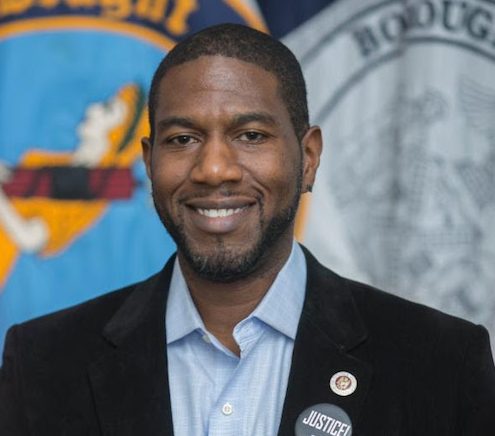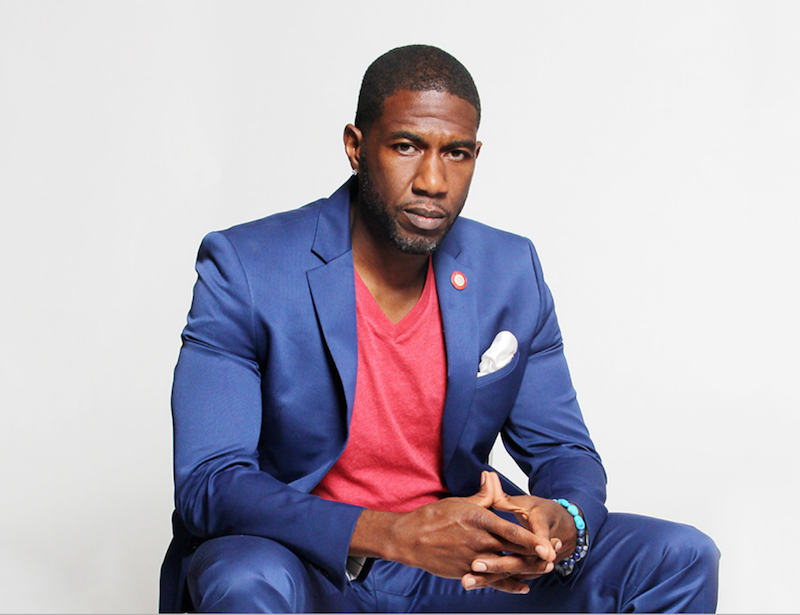City Councilman Jumaane Williams (D-Brooklyn) is facing a broad field of competitors for the open seat for Public Advocate, but the longtime activist is hoping to bring new credentials to the citywide office.
The Public Advocate’s office was created in 1989 to be a watchdog over city agencies and officials. The top functions of the position include introducing and voting on legislation having to do with all aspects of City life; negotiating the City’s budget with the Mayor and approving its adoption; Monitoring City agencies such as the Department of Education (DOE) and the NYPD to make sure they’re effectively serving New Yorkers; and reviewing land use proposal and making decisions about the growth and development of the city.
Williams is hoping that his background as an outspoken community activist and self-proclaimed successful elected official – he’s passed 53 pieces of legislation since taking office in 2010 – will make him the standout for the job.
Williams currently represents the 45th council district which includes East Flatbush, Flatbush, Flatlands, Marine Park, and Midwood in Brooklyn. He is hoping to bring his years as a Council representative toward the city-wide position starting with the ability to represent all New Yorkers.
“I am the best combination of activist and elected official, which is what I think this office needs. Someone who can lift the issues but can actually get something done about it. But going from a local elected official to a citywide position brings a whole host of additional resources and magnifies my ability to amplify other peoples voices and concerns and get responses even quicker,” said Williams.

Williams is hoping to tackle affordable housing first if elected to the position, specifically targeting rezonings and placing a moratorium on Mandatory Inclusionary Housing. The Brooklynite is also looking to include a Racial Impact Study (RIS) to accompany the Environmental Impact Study (EIS) currently required as part of every rezoning.
“It is clear that there were absolute failures when it came to how to handle rezonings when it comes to affordability. The mayor put forth a terrible zoning proposal and unfortunately we haven’t had the leadership position to really push back against it.”
“In addition to that we, need to have a racial impact study that needs to be included in the environmental impact study because there is a huge impact to communities that have made it so that these communities are viable now and they are being pushed out,” added Williams.
Williams believes that creating more housing options for all New Yorkers will help to combat some of the problems facing the homeless community across the city.
“There’s a lot of things we have to address when it comes to housing. I am a tenant and community organizer by training, I have been working on these issues for over 20 years. I joke that before Barack Obama no one knew what community organizing was, I had to explain to my mother why it was a real job. So these are things that I care very deeply about. The answer to lowering homelessness is housing. But first we have to treat all forms of homelessness as one issue. I believe we need to combine them so we can streamline effective solutions because not everybody who is homeless is the same,” said Williams.
Though not in total agreement with the Mayor Bill de Blasio’s rezoning proposal that passed in 2016, Williams plans on having an open and honest relationship with the mayor.
“You always have to be able to hold people accountable when necessary and be able to work with them to get things done. And I’ve always prided myself on being able to do both. So whether there is a disagreement, you have to be able to disagree but where there isn’t, you have to have the ability to work together,” said Williams.
He believes that this along with his tenacity to get legislation passed and be an active community voice is what is going to make him the best candidate for the position come the end of the month.
“Minimizing politics is a unique skill I believe I have. You usually you have someone who can push and be against something but sometimes they can’t get something done after that. I am proud to say I have been able to do both,” said Williams.
Williams is hoping to use that drive to introduce new functions to the office including having the office have subpoena powers, have an independent budget and have a role on the Metropolitan Transportation Authority (MTA) board.
“I think it’s a formidable and necessary office, especially for someone who is not using it to launch to somewhere else. Who is actually using it for what it was designed to do.
Though, don’t count Williams out of a potential mayoral run.
“From the moment I got elected, I decided that the seat I’m holding is not more important than the people I’m representing. I also decided that I didn’t get elected to get re-elected. I didn’t get elected initially to be Public Advocate, I got elected to do my job and I wanted to use that job to create transformational change. To the extent that that can get me to higher office, that’s awesome but it may not,” said Williams.
Last year, the longtime lawmaker, ran for Lieutenant governor, which he believes has given him a chance to get to know voters again.
“These are two different races. But we are coming in with a map of where people voted for me, where people came out. That’s important because that gives us an opportunity to engage with people a little quicker than other folks but it also gives me an opportunity to say, ‘I would like to re-earn your vote one more time,’ that is an important thing,” said Williams.
Williams believe that his natural ability to speak out and speak up sets him apart in the broad field.
“I have no problem being in the street with the people, getting in trouble for civil disobedience, I have no problem challenging the people in power. While doing that, I have no problem making sure that there is effective policy change, I have passed more pieces of legislation than any sitting council member. That to me is what is needed. You have to have someone who will take the risk, have the courage and have the patience,” added Williams.
Williams is committed to holding the values of the office to the highest potential and plans to exercise and amplify the powers of the Public Advocate if elected.
“This position was created in 1989 with Mark Green being the first. They said they wanted the position to rise above politics, giving us five powers-introduce legislation, act as an ombudsman, be a watchdog over government, be a go between the people and local officials and be a charter cop making sure agencies are complying with their charters-that in combination with the bully pulpit is very powerful,” concluded Williams.
The current pack of candidates vying to be the next Public Advocate include former Speaker Melissa Mark Viverito, City Council members Rafael Espinal, Eric Ulrich and Ydanis Rodriguez; and Assemblymembers Danny O’Donnell and Michael Blake.
The special election is Feb. 26.










